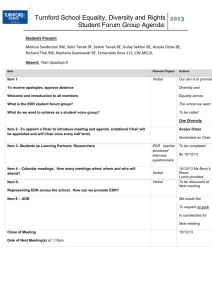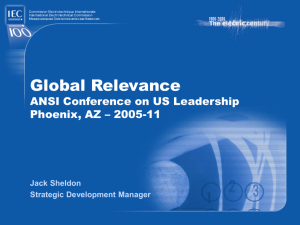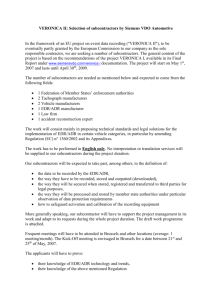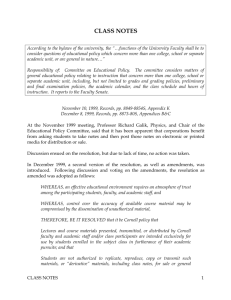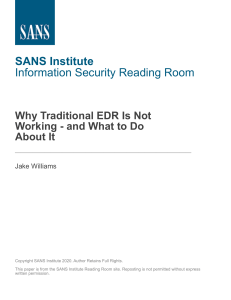1 Feb 16 — EdR Selected for On-Campus Development at Cornell
advertisement
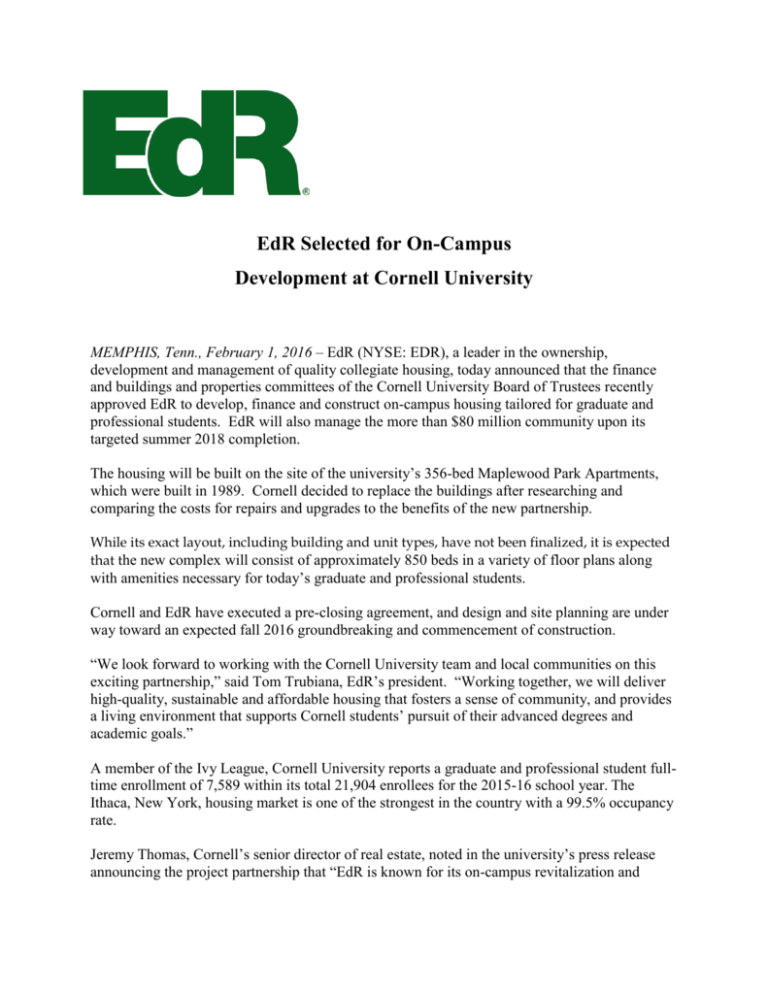
EdR Selected for On-Campus Development at Cornell University MEMPHIS, Tenn., February 1, 2016 – EdR (NYSE: EDR), a leader in the ownership, development and management of quality collegiate housing, today announced that the finance and buildings and properties committees of the Cornell University Board of Trustees recently approved EdR to develop, finance and construct on-campus housing tailored for graduate and professional students. EdR will also manage the more than $80 million community upon its targeted summer 2018 completion. The housing will be built on the site of the university’s 356-bed Maplewood Park Apartments, which were built in 1989. Cornell decided to replace the buildings after researching and comparing the costs for repairs and upgrades to the benefits of the new partnership. While its exact layout, including building and unit types, have not been finalized, it is expected that the new complex will consist of approximately 850 beds in a variety of floor plans along with amenities necessary for today’s graduate and professional students. Cornell and EdR have executed a pre-closing agreement, and design and site planning are under way toward an expected fall 2016 groundbreaking and commencement of construction. “We look forward to working with the Cornell University team and local communities on this exciting partnership,” said Tom Trubiana, EdR’s president. “Working together, we will deliver high-quality, sustainable and affordable housing that fosters a sense of community, and provides a living environment that supports Cornell students’ pursuit of their advanced degrees and academic goals.” A member of the Ivy League, Cornell University reports a graduate and professional student fulltime enrollment of 7,589 within its total 21,904 enrollees for the 2015-16 school year. The Ithaca, New York, housing market is one of the strongest in the country with a 99.5% occupancy rate. Jeremy Thomas, Cornell’s senior director of real estate, noted in the university’s press release announcing the project partnership that “EdR is known for its on-campus revitalization and innovation efforts, constructing quality, long-lasting and sustainable buildings and developments that meet the expectations of today’s students.” About EdR EdR (NYSE:EDR) is one of America's largest owners, developers and managers of collegiate housing. EdR is a self-administered and self-managed real estate investment trust that owns or manages 80 communities with nearly 42,000 beds serving 51 universities in 23 states. EdR is a member of the Russell 2000 Index and the Morgan Stanley REIT indices. For details, please visit the company's Web site at www.EdRtrust.com. For more information, contact: J. Drew Koester, Senior Vice President, Capital Markets and Investor Relations 901-259-2523 dkoester@EdRtrust.com For media information or photography, contact: Susan Jennings, Vice President, Corporate Communication and Marketing 901-259-2506 sjennings@EdRtrust.com Safe Harbor Statement under the Private Securities Litigation Reform Act of 1995 Statements about the company's business that are not historical facts are "forward-looking statements." Forward-looking statements are based on current expectations. You should not rely on our forward-looking statements because the matters they describe are subject to known and unknown risks and uncertainties that could cause the company's future results, performance, or achievements to differ significantly from the results, performance, or achievements expressed or implied by such statements. Such risks are set forth under the captions "Item 1A. Risk Factors" and "Forward-Looking Statements" in our annual report on Form 10-K and under the caption "Item 2. Management's Discussion and Analysis of Financial Condition and Results of Operations" (or similar captions) in our quarterly reports on Form 10-Q, and as described in our other filings with the Securities and Exchange Commission. Forward-looking statements speak only as of the dates on which they are made, and the company undertakes no obligation to update publicly or revise any guidance or other forward-looking statement, whether as a result of new information, future developments, or otherwise, unless required by law.
